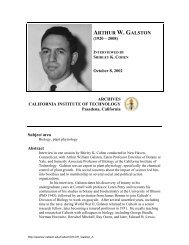Interview with David Baltimore - Caltech Oral Histories
Interview with David Baltimore - Caltech Oral Histories
Interview with David Baltimore - Caltech Oral Histories
You also want an ePaper? Increase the reach of your titles
YUMPU automatically turns print PDFs into web optimized ePapers that Google loves.
<strong>Baltimore</strong>-50<br />
The experiment I described to you—putting antibiotic-resistance genes into a bacterium—and<br />
making hybrid viruses of various sorts, putting virus genes willy-nilly into different places. We<br />
had a little bit of a hierarchy of what might be really dangerous.<br />
LIPPINCOTT: And you wanted to stop all such things.<br />
BALTIMORE: We just asked for a voluntary moratorium in the scientific community prefatory to<br />
having a meeting—which turned out to be the Asilomar meeting—in which the community<br />
could consider these experiments and come up <strong>with</strong> a safe way forward. So that was the origin<br />
of Asilomar. We did it at Asilomar because Paul said, “That’s a great place to meet.”<br />
LIPPINCOTT: Well, what about the Cambridge City Council<br />
BALTIMORE: That’s later. See, this issue was not publicly terribly interesting until we held the<br />
Asilomar conference. We agreed there should be press there, but we insisted that the press agree<br />
that they would write nothing until after the meeting was over, so that there wouldn’t be<br />
reporting on day-to-day events, and they agreed to that and held to that. So right after the<br />
meeting, there was a spate of publicity about the fact that the meeting had taken place, and it was<br />
good in the sense that because we insisted that they wait until the end, they could start <strong>with</strong> the<br />
end result, which was a call for a continued moratorium and an NIH committee to grade<br />
experiments and a way forward on this graded experimental basis.<br />
LIPPINCOTT: Were these scare stories, in any sense<br />
BALTIMORE: They were a little bit scare stories. Sure. It’s sort of inevitable that they would be.<br />
But they were pretty responsible. <strong>David</strong> Perlman at the San Francisco Chronicle. He’s still<br />
writing stories—wonderful guy. And I can’t remember whether the New York Times had<br />
someone there or not—maybe Harold Schmeck. I’ve forgotten who was there from the press.<br />
LIPPINCOTT: But you think they were by-and-large responsible stories

















